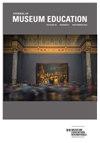博物馆专业人员终身反压迫学习
IF 0.6
Q3 EDUCATION & EDUCATIONAL RESEARCH
引用次数: 0
摘要
正规的博物馆学教育在博物馆专业人员的工作生活中所占的比例很小。这种有限的经历不可能让一个人完全适应反压迫工作的生活。博物馆需要的不仅仅是正规的教育学,而是该领域的终身反压迫学习者。本文介绍了国际良心网站联盟(ICSC)的两个框架,以帮助读者成为更好的终身学习者。它将这些理论框架与世界各地公务员制度委员会成员关于他们终身学习经历的采访相匹配。本文章由计算机程序翻译,如有差异,请以英文原文为准。
Lifelong Anti-Oppression Learning for Museum Professionals
ABSTRACT Formal museology education makes up a very small, if any, proportion of a museum professional's working life. It is not possible for that limited an experience to fully equip someone for a life of anti-oppression work. More than formal pedagogy, museums need lifelong anti-oppression learners in the field. This article presents two frameworks from the International Coalition of Sites of Conscience (ICSC) to help readers become better lifelong learners. It matches these theoretical frameworks with interviews from ICSC members around the world about their experience as lifelong learners.
求助全文
通过发布文献求助,成功后即可免费获取论文全文。
去求助
来源期刊

Journal of Museum Education
EDUCATION & EDUCATIONAL RESEARCH-
CiteScore
1.20
自引率
16.70%
发文量
34
期刊介绍:
The Journal of Museum Education (JME) is the premier peer-reviewed publication exploring and reporting on theory, training, and practice in the museum education field. Journal articles—written by museum, education, and research professionals—explore such relevant topics as learning theory, visitor evaluation, teaching strategies for art, science, and history museums, and the responsibilities of museums as public institutions. Published 4 times a year, each issue consists of a guest edited section focused on a specific theme and articles about new research, current trends, tools, frameworks, and case studies, perspectives, and book, exhibit, and program reviews.
 求助内容:
求助内容: 应助结果提醒方式:
应助结果提醒方式:


